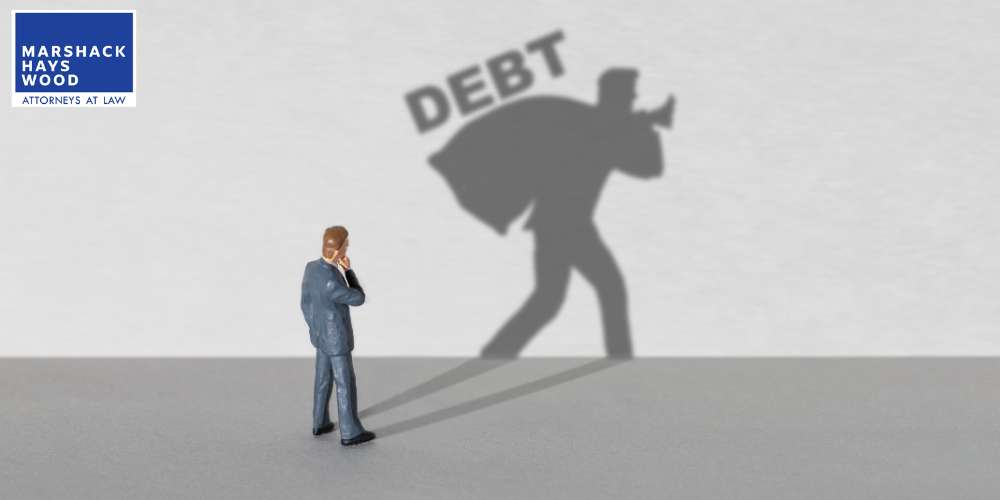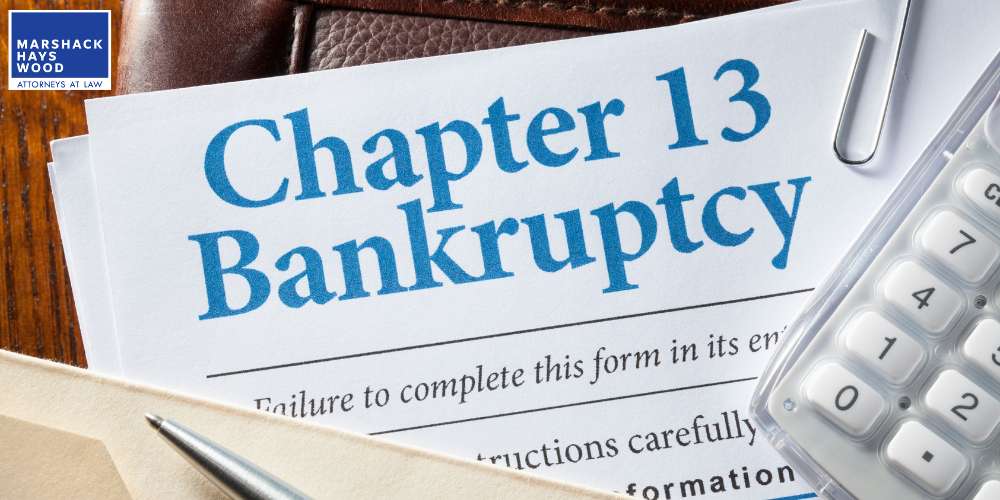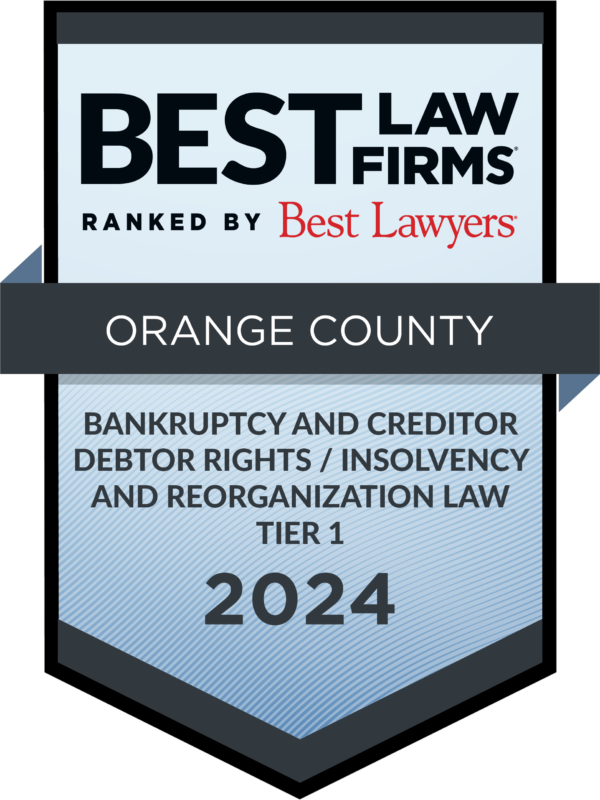Business Bankruptcy Lawyer in Orange County
Home » Practice Areas » Orange County Bankruptcy Attorney » Business Bankruptcy
Practice Areas
Debt Relief Options for Small, Medium, and Large Businesses in Orange County

If your business has accrued too much debt, it may feel like the walls are closing in on you. Creditors are calling daily, you’re struggling with your business debt, and you feel you have nowhere to turn. Thankfully, a legal option exists that can help businesses achieve relief from creditor harassment, reduce or eliminate their business debt, and give you much-needed relief – bankruptcy. Speak with an Orange County business bankruptcy lawyer as soon as possible to discuss your options.
At Marshack Hays Wood, our business bankruptcy attorneys have extensive experience helping large, medium, and small business owners reorganize and repair their finances. We use our knowledge of the Bankruptcy Code and California law to help the bankruptcy process go as smoothly as possible for the businesses we work with.
To schedule a consultation with one of our skilled business bankruptcy lawyers, please call our office at (949) 333-7777 today.
Is Bankruptcy a Good Option for Struggling Businesses?
The best way to determine if bankruptcy will help your business is to speak with a qualified bankruptcy attorney. We can examine your situation and give you sound legal advice on protecting yourself and your business.
It’s also important to note that, like personal bankruptcy chapters, each business bankruptcy chapter is unique and offers different benefits. Depending on your business assets, debts, and other factors, one chapter may benefit you more than others.
In other words, business bankruptcies can benefit large or small businesses. However, working with attorneys who have experience with large and small business bankruptcy is crucial. The team at Marshack Hays Wood is here to help Orange County businesses of all sizes navigate their way through the complicated California bankruptcy process.
What is Business Bankruptcy?
Business bankruptcy differs from bankruptcies involving only personal finances, but the processes are similar. When a business files for bankruptcy, the process occurs in federal bankruptcy court. The main goal of bankruptcy for businesses is to help resolve businesses’ financial issues through liquidation or reorganization of their finances.
Generally speaking, if a business decides to file bankruptcy, it will file under one of three chapters. These are Chapter 7, Chapter 11, and Chapter 13. The chapter you should file depends on the type of business you have and the specifics of your situation.
In the following sections, we outline these three bankruptcy chapters and which businesses can benefit from them the most.

Chapter 7 Bankruptcy for Businesses
Unfortunately, many small businesses struggle to stay afloat for a full year, let alone five or ten years. If a business acquires overwhelming business debts, this may mean the business doesn’t have a viable future. In this case, Chapter 7 bankruptcy is often the best choice.
Also known as liquidation bankruptcy, Chapter 7 could benefit a limited liability company, sole proprietorship, or general partnership. It can also benefit businesses that don’t have a considerable amount of assets. This is what leads business owners to choose Chapter 7, as a Chapter 13 reorganization would make less sense.
However, as with personal debt bankruptcies, businesses must pass a means test to file Chapter 7. The Chapter 7 means test determines whether the business’s income exceeds a certain amount. If so, that business cannot file Chapter 7. If the business’s income does not exceed the predetermined amount, it may file and benefit from Chapter 7.
After the Chapter 7 case begins, the bankruptcy court appoints a Chapter 7 trustee to take control of the business’s assets. These assets will be distributed to the creditors (liquidated). Once the assets have been distributed, the trustee will be paid for their role in the case. Sole proprietorships will receive a bankruptcy discharge, while partnerships and corporations will not.
To learn more, reach out to an Orange County Chapter 7 bankruptcy lawyer at Marshack Hays Wood today.
Chapter 11 Bankruptcy for Businesses
For businesses that have a chance to continue their operations, Chapter 11 bankruptcy is often a better option. In most cases, corporations and partnerships will file Chapter 11, while sole proprietorships will file Chapter 7. However, many sole proprietorships use it when they cannot pass the means test to file Chapter 7.
In Chapter 11 bankruptcy, the company reorganizes its finances and remains in business under the supervision of a Chapter 13 trustee. The company proposes a reorganization plan on how it intends to handle its creditors. The plan may include actions such as recovering assets, terminating contracts or leases, and repaying a portion of the debt while discharging the rest to become profitable again.
Creditors will then vote on the company’s plan. If those creditors and the bankruptcy court deem the plan to be fair and reasonable, the plan is approved. Then, the plan proceeds as proposed. Chapter 11 cases are very complicated, and many do not succeed because of minor mistakes. In fact, it often takes a year or longer for a company’s reorganization plan to be approved.
Working with a skilled Orange County Chapter 11 bankruptcy attorney can give you the support and insight you need for smooth sailing through your bankruptcy case.
Subchapter V of Chapter 11
As of August 2019, the Small Business Reorganization Act gives filers another option for filing under Chapter 11. Subchapter V only applies if the applicant wants it to apply. It does not require the appointment of a committee of creditors, nor does it require those creditors to approve the court plan.
Depending on the specifics of your case, Subchapter V may or may not be beneficial over filing for regular Chapter 11. We recommend speaking with a business bankruptcy attorney to determine which is the best course of action for you.
Chapter 13 Bankruptcy for Businesses
Most Chapter 13 bankruptcy cases are reserved for individuals, but sole proprietorships may also file under Chapter 13. This is possible because sole proprietorships are basically extensions of their owners, and thus indistinguishable. One can pursue small business bankruptcy under Chapter 13 if their goal is reorganization.
You will file a plan for reorganization with the bankruptcy court that outlines how you intend to repay your debts to your creditors. During the Chapter 13 process, the sole proprietorship can remain in business.
Depending on one’s income, assets, property, and total debt, the amount one must repay can differ. Chapter 13 is an especially popular option for sole proprietors whose personal assets are intermingled with their business assets. It is also popular for its ability to save one’s house, which may not be an option under Chapter 7.
Think this might be the right chapter for you? Call an experienced California Chapter 13 bankruptcy lawyer at our firm to discuss and identify your best options moving forward.

Business Bankruptcy Exemptions in California
Both the federal government and individual states have specific bankruptcy exemptions that they allow. Some states allow filers to choose which set of exemptions to use, but others do not. California bankruptcy law has a set of unique bankruptcy exemptions, but you must meet certain criteria to file and use these exemptions.
To file bankruptcy in California, you must live in the state for at least 180 days. To use California bankruptcy exemptions, you must live in the state for at least 730 days before filing. If someone has not lived in the state that long, they must use their previous state’s exemptions.
California does not allow filers to choose between federal and state bankruptcy exemptions if they want to keep property. To keep property in a California bankruptcy, one must use state exemptions. However, you can ultimately choose between federal and state exemptions.
California is unique from every other state because it has two exemption systems instead of one. These two systems are System 1 (704 exemptions) and System 2 (703 exemptions). In most cases, those with considerable home equity prefer System 1. Conversely, System 2 is preferred by those without a lot of home equity.
With very few exceptions, married couples cannot double the exemption amount.
California Bankruptcy 704 Exemptions (System 1)
- The 704 homestead exemption allows filers to keep real or personal property that they reside in when they file, but only up to $600,000.
- Motor vehicle exemptions protect equity in vehicles up to $3,625.
- Personal property such as the following:
- Health aids
- Personal and household items
- Jewelry, art, or heirlooms up to $3,825
- Building materials for a residence up to $3,825
- Personal injury and wrongful death recoveries as necessary
- Burial plots
- Bank deposits up to $1,826
- Bank deposits from Social Security up to $3,825
- Up to 75% of wages paid in the 30 days before filing
- Vacation credits as a public employee
- Certain public benefits
- Pensions and retirement
- Tools of the trade up to $9,700 for a single filer, up to $19,050 for married couples in the same occupation
- Certain insurance benefits
- Other miscellaneous exemptions
California Bankruptcy 703 Exemptions (System 2)
- The 703 homestead exemption lets filers keep up to $31,950 in personal or real property that is used as a residence.
- The motor vehicle exemption lets filers keep up to $6,375 of vehicle equity.
- Other forms of personal property, such as:
- Certain personal items (furniture, clothing, books, instruments, etc.) up to $800 per item.
- Health aids
- Wrongful death recoveries as needed for support
- Jewelry up to $1,900
- Burial plot up to $31,950 if not using the homestead exemption
- Personal injury recoveries up to $31,950
- Pensions and retirement
- Certain public benefits
- Tools of the trade up to $9,525
- Child support and alimony necessary for support
- Certain insurance benefits
- Wildcard exemption allows up to $1,700, plus any amount of the homestead exemption the filer did not use

Steps for Filing Business Bankruptcy in Orange County
Before taking any steps toward filing, we always recommend speaking with experienced bankruptcy attorneys about your situation. As we mentioned before, California bankruptcy cases are very complex, and even a small mistake could derail your case. Before deciding which chapter to file, you must take a bankruptcy means test. This test measures whether your income is too high to file for Chapter 7 bankruptcy.
Once you have determined which chapter will work best for you, you should gather all necessary documents and financial information from the past two years. You should carefully list your income, expenses, assets, and liabilities. One of our attorneys will help you with this part.
Then, your exemptions are determined, and you can officially file for bankruptcy. The automatic stay goes into effect, which stops creditor harassment, collection attempts, foreclosures, and repossessions. This gives you the breathing room you need to determine how to proceed.
Depending on which chapter you file, your debts will either be discharged or reduced. Our Orange County bankruptcy law firm will guide you through the entire process and ensure that everything is filed correctly the first time.
Are You Personally Liable for Business Debts in Bankruptcy?
In general, unless you co-signed for the debt, you will not have any personal liability connected to that debt. The business is a separate legal entity from you, which means its debts are separate as well. There are some cases, however, when an individual could be personally liable for business debts. We recommend speaking with an attorney about your business type and structure to help find your level of personal liability.
Can Owners Start a New Business After Filing for Bankruptcy?
Yes. If you so desire, you can start a new business almost immediately. However, it most likely won’t be in your best interest. This is because bankruptcy damages your credit rating. A lower credit rating could lead to much higher interest rates. It is often a better option to take the time to rebuild your credit before starting another business.
Do You Need a Business Bankruptcy Attorney in Orange County?
You are not legally required to hire an attorney for your bankruptcy case, but we strongly recommend doing so. California bankruptcies are very complex, so having experienced legal counsel on your side will only help and protect you. If your California business is in financial trouble, it is in your best interest to hire a lawyer before filing bankruptcy.

Contact the Orange County Business Bankruptcy Lawyers at Marshack Hays Wood Today
At Marshack Hays Wood, our business bankruptcy attorneys have considerable experience handling bankruptcy cases for businesses of all sizes. If you are considering large or small business bankruptcy in Orange County, our law firm is here for you.
To achieve a fresh start through bankruptcy, working with a skilled Orange County business bankruptcy lawyer is the first step you should take. Contact our office at (949) 333-7777 or send a message online today to schedule a free consultation about your case.
READY TO GET STARTED?
At Marshack Hays Wood, our attorneys provide the legal support you need to move forward with confidence. Let us help you take the first step toward financial stability.


